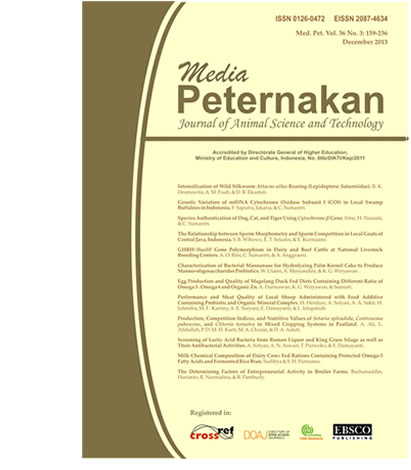The Determining Factors of Entrepreneurial Activity in Broiler Farms
Abstract
Indonesia still requires approximately 4 million entrepreneurs to become a developed country. This research aimed at identifying and analyzing the factors forming the broiler farm entrepreneurial activities that contribute on generating new entrepreneurs in Indonesia. Primary data were collected through questionnaire and analyzed by Structural Equation Modeling (SEM). Independent latent variables were innovations (IN), productions (DP), competitiveness (DS), risks (PR), labors (TK), and policies (KP), and then entrepreneurial activities (AK) as dependent latent variable. The results showed that the model was built (MODEL1 as measurement model and MODEL2 as structural model) had goodness fit and good reliability measurement variables (CR≥0.70, VE≥0.50). Innovation was reflected by the level of willingness to innovate (λ=0.63) and level of technology (λ=0.62). Production was reflected by production efficiency (λ=0.62) and cost control (λ=0.43). Competitiveness was reflected by the internet (λ=0.56), the cost of starting (λ=0.55), and new business formation (λ=0.58). Labor was reflected by the training and development (λ=0.57), and motivation (λ=0.42). Policies was reflected by access to land (λ=0.56), technical assistance (λ=0.60), research and technology (λ=0.66), and copyright protection (λ=0.64). The entrepreneurial activity of broiler farms were formed by innovation (γ=0.91), competitiveness (γ=0.94), and policies (γ=0.98). Broiler farms contributed positively to generate new entrepreneurs. Production and information technology development program, facilitation of the creation of new ventures program, business expansion program, and a program of strengthening intellectual property rights on broiler farms should be a priority of the Indonesian government programs in the future.



